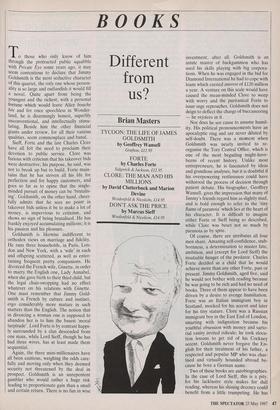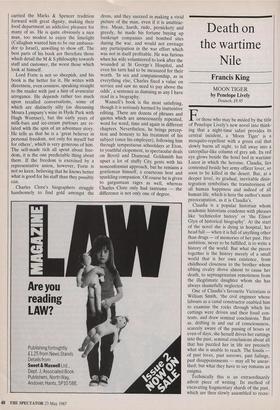BOOKS
Different from us?
Brian Masters
TYCOON: THE LIFE OF JAMES GOLDSMITH by Geoffrey Wansell
Grafton, f12.95
FORTE by Charles Forte
Sidgwick & Jackson, f12.95
CLORE: THE MAN AND HIS MILLIONS by David Clutterbuck and Marion Devine
Weidenfeld & Nicolsdn, £14.95
DON'T ASK THE PRICE by Marcus Sieff
Weidenfeld & Nicolson, f14.95
To those who only know of him through the protracted public squabble with Private Eye some years ago, it may seem contentious to declare that Jimmy Goldsmith is the most seductive character of this quartet, the only one whose person- ality is so large and outlandish it would fill a novel. Quite apart from being the youngest and the richest, with a personal fortune which would leave Alice bouche bee and for once speechless in Wonder- land, he is disarmingly honest, superbly unconventional, and intellectually stimu- lating. Beside him the other financial giants under review, for all their various qualities, seem commonplace and banal.
Sieff, Forte and the late Charles Clore have all felt the need to proclaim their devotion to public service. Clore was furious with criticism that his takeover bids were destructive; his purpose, he said, was not to break up but to build. Forte main- tains that he has striven all his life for perfection and for happy customers, and goes so far as to opine that the single- minded pursuit of money can be 'brutalis- ing'. Goldsmith, on the other hand, cheer- fully admits that he sees no point in takeover bids unless it be to make a lot of money, is impervious to criticism, and shows no sign of being brutalised. He has frankly enjoyed accumulating millions; it is his passion and his pleasure.
Goldsmith is likewise indifferent to orthodox views on marriage and fidelity. He runs three households, in Paris, Lon- don and New York, with a 'wife' in each and offspring scattered, as well as enter- taining frequent pretty companions. He divorced the French wife, Ginette, in order to marry the English one, Lady Annabel, when she gave birth to their third child, but the legal chair-swopping had no effect whatever on his relations with Ginette. One must remember that Jimmy Gold- smith is French by culture and instinct, ergo considerably more mature in such matters than the English. The notion that in divorcing a woman one is supposed to abandon her is to him the basest 'moral turpitude'. Lord Forte is by contrast happi- ly surrounded by a clan descended from one mate, while Lord Sieff, though he has had three wives, has at least made them sequential.
Again, the three mini-millionaires have all been cautious, weighing the odds care- fully and moving only when they deemed security not threatened by the deal in prospect. Goldsmith is an unrepentent gambler who would rather a huge risk leading to proportionate gain than a small and certain return. There is no fun in wise
investment, after all. Goldsmith is an astute master of backgammon who has used his skills playing with big corpora- tions. When he was engaged in the bid for Diamond International he had to cope with loans which carried interest of £120 million a year. A venture on this scale would have caused the mean-minded Clore to weep with worry and the puritanical Forte to issue sage reproaches. Goldsmith does not deign to deflect the charge of buccaneering — he rejoices in it.
Nor does he see cause to assume humil- ity. His political pronouncements have an apocalyptic ring and are never diluted by self-doubt. There was a moment when Goldsmith was nearly invited to re- organise the Tory Central Office, which is one of the most beguiling might-have- beens of recent history. Unlike most entrepreneurs, he is fascinated by ideas and grandiose analyses, but it is doubtful if his overpowering restlessness could have withstood the process of decision through patient debate. His biographer, Geoffrey Wansell, gives the impression that many of Jimmy's friends regard him as slightly mad, and is bold enough to refer to the 'tiny flame of paranoia' which lies at the heart of his character. It is difficult to imagine either Forte or Sieff being so described, while Clore was beset not so much by paranoia as by spite.
Of course, there are attributes all four men share. Amazing self-confidence, stub- bornness, a determination to master fate, ambition, and (except for Lord Sieff) the insatiable hunger of the predator. Charles Forte decided as a child that he would achieve more than any other Forte, past or present. Jimmy Goldsmith, aged five, said he would not bother with reading because he was going to be rich and had no need of books. Three of them appear to have been driven by a desire to avenge humiliation. Forte was an Italian immigrant boy in Scotland, mocked for his accent and later for his tiny stature. Clore was a Russian immigrant boy in the East End of London, smarting with indignation because his youthful obsession with money and sarto- rial vanity invited ridicule; he took elocu- tion lessons to get rid of his Cockney accent. Goldsmith never forgave the En- glish for their treatment of his father, a respected and popular MP who was chas- tised and virtually hounded abroad be- cause he bore a German name.
Two of these books are autobiographies. In the case of Lord Sieff, this is a pity, for his lacklustre style makes for dull reading, whereas his shining decency could benefit from a little trumpeting. He has carried the Marks & Spencer tradition forward with great dignity, making their food department an addictive pleasure for many of us. He is quite obviously a nice man, too modest to enjoy the limelight (Callaghan wanted him to be our ambassa- dor to Israel), unwilling to show off. The best parts of his book are therefore those which detail the M & S philosophy towards staff and customer, the worst those which look at himself.
Lord Forte is not so sheepish, and his book is the better for it. He writes with directness, even cosiness, speaking straight to the reader with just a hint of avuncular arrogance. He depends rather too much upon recalled conversations, some of which are distinctly silly (as discussing Moura Lympany's wine in Hyde Park with Hugh Wontner), but the early years of milk-bars and ice-cream parlours are re- lated with the spin of an adventure story. He tells us that he is a 'great believer in personal freedom, not only for myself but for others', which is very generous of him. The self-made rich all spout about free- dom, it is the one predictable thing about them. If the freedom is exercised by a representative union, however, Forte is not so keen, believing that he knows better what is good for his staff than they possibly can.
Charles Clore's biographers struggle handsomely to find gold amongst the dross, and they succeed in making a vivid picture of the man, even if it is unattrac- tive. Mean, harsh, rude, pernickety and greedy, he made his fortune buying up bankrupt companies and bombed sites during the war, and would not envisage any participation in the war effort which was not in itself profitable. He was furious when his wife volunteered to look after the wounded at St George's Hospital, and even his tarts had to be measured for their worth. 'In sex and companionship, as in everything else, Charles fixed a value on service and saw no need to pay above the odds', a sentence as damning as any I have read in a biography.
Wansell's book is the most satisfying, though it is seriously harmed by inattentive editing. There are dozens of phrases and quotes which are unnecessarily repeated, word for word, time and again in different chapters. Nevertheless, he brings percep- tion and honesty to his treatment of his subject (once his employer), following him through tempestuous schooldays at Eton, to youthful elopement, to spectacular deals on Bovril and Diamond. Goldsmith has upset a lot of stuffy City gents with his nonconformist approach, but he remains a gentleman himself, a courteous host and sparkling companion. Of course he is given to gargantuan rages as well, whereas Charles Clore only had tantrums — the difference is not only one of degree.










































































 Previous page
Previous page